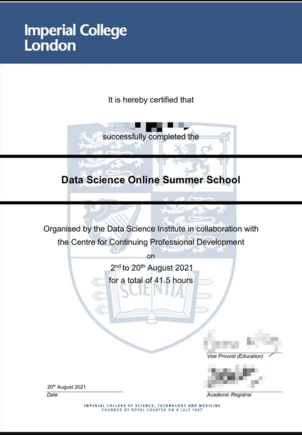Consistently rated amongst the world's best universities (4th in Europe and 9th in World, QS World University Rankings 2020), Imperial College London is a science-based institution with an international reputation for excellence in teaching and research. Imperial attracts over 17,000 students and 8,000 staff of the highest international quality from over 136 different countries.
Since its foundation in 1907, Imperial's contributions to society have included the discovery of penicillin, the development of holography and the foundations of fibre optics. This commitment to the application of research for the benefit of all continues today, with current areas of focus including interdisciplinary collaborations to improve global health, tackle climate change, develop sustainable sources of energy, address security challenges, develop data management and analysis technologies for supporting data driven research, and tackling problems at molecular scale.
Located in the heart of London, Imperial has the greatest concentration of high-impact research of any major UK university, according to the Research Excellence Framework (REF) results published in December 2014. Innovative research at the College explores the interface between science, medicine, engineering and business to deliver practical solutions to a broad spectrum of societal and economic issues. We address these challenges on three levels, which are interdependent (core disciplines, multidisciplinary research and global challenges). Many of our academics are engaged with all three and our academic staff includes some of the world’s most renowned scientists, medics and engineers whose contributions to their field have been recognised internationally.
Imperial’s Centre for Continuing Professional Development had extensive experience in developing and running a range of online and on campus summer/winter schools for undergraduate students. We draw on Imperial’s education pedagogy of online learning in designing and delivering the summer/winter school to provide an engaging learning experience for students. Various interactive applications are used to support live teaching, online group projects are designed to assess students’ learning outcomes and virtual social platform created in Flipgrip provides students with a networking environment.
The RCA started life in 1837 as the Government School of Design. In 1967 the RCA was granted a Royal Charter which enshrines its purpose as being ‘to advance learning, knowledge and professional competence [in art and design’... through teaching, research and collaboration with industry and commerce.’ To this day, it remains the world’s most influential wholly postgraduate university institution of art and design, offering MA, MPhil and PhD degrees. Our graduates have led many global businesses (including IDEO, Kia Motors, Jaguar Land Rover, Burberry, Dyson and Apple).
The RCA is ranked as having the ‘highest number of student spin-outs with university ownership in recent years in the UK’ (PACEC report for HEFCE, 2015) and InnovationRCA was recently awarded the UK Business Angels Association award for UK University Accelerator of the Year. The RCA is renowned for teaching and incubating real-world innovation and has been named as the world’s leading university for Art and Design for the past 6 years by QS Rankings.
Leading companies choose to work with the RCA on custom executive education programmes that address their strategic goals, unique challenges and identified opportunities. Courses have been delivered in Dubai, Hong Kong, Singapore, China, Japan and Mexico. Organisations that have benefited from RCA innovation expertise include Sony, Ford, NHS, BAA plc, Fujitsu, Kuwait Foundation for the Advancement of Sciences, GSK, Panasonic, Samsung, JP Morgan, Huawei, Majid al Futtaim and Cern.
Our practical innovation workshops and methodologies have been incorporated into those offered by other institutions. These include London Business School, Imperial College London, Judge Business School, Fudan University, National University of Singapore, Shanghai University and the University of Cambridge.
Jointly delivered by Imperial College London and the Royal College of Art, the Design for Global Challenges Online Winter School is a 3-week multidisciplinary programme designed for undergraduate students currently studying at a university in China with an interest in learning how to tackle world challenges through service design.
The aim of the programme is to enable students to explore some of the current global challenges in climate change, global health, cyber security and propose an innovative idea to design a service that could tackle one of the areas.
In addition to the global challenges, students will gain an insight into data science, hear latest advances in robotics and meet some of our graduate entrepreneurs who are driving progress by launching their design innovations into the commercial world.
Students will develop personal and professional skills through interactive workshops in design thinking, team-building and presentation and experience team based learning through a service design group project.
Furthermore, as Imperial College London and RCA are a multidisciplinary space for education, research, translation and commercialisation, the winter school students will experience the benefit of being part of a leading research community and the opportunity to engage with Imperial and RCA student ambassadors through online social activities.
Period 1: In the first period(first 5 teaching days), students will be introduced to design thinking and form a team by exploring their social relations and roles through a leadership and team building workshop. As students familiarise themselves with one another, they will analyse and evaluate some of the global challenges in climate change, health and cyber-security and the impact it has on society and companies. Students will be introduced to service design and encouraged to identify one area of a global challenge that needs tackling and propose an innovative idea to design a service that could either control or reduce the global challenge. They will also engage in fun social activities to learn cultural differences and visit London Landmarks virtually.
Period 2: During this period, students will apply their creativity and design ideas to develop their service. They will also explore how advances in robotics and data science technology are transforming the future. They will hear from successful design entrepreneurs sharing their work. The effective communication workshop will support them with their presentation skills in preparation for their final day. At the end of the week students present their service design to a panel. This is an opportunity to put all their learnings from throughout the course into practice.
On completion of the winter school, students will be able to:
● Analyse and evaluate the impact of climate change on society and the environment.
● Analyse and evaluate the impact of major global diseases and the changing future of healthcare policies and innovations.
● Analyse and evaluate the challenges of the internet and new frontiers in cyberspace/digital media security that companies face.
● Understand how advances in robotics and data science technology are transforming the future.
● Apply service design tools and develop a service to tackle a global challenge.
● Recognise how companies have started up from entrepreneurs.
● Develop and practise valuable professional skills in team building, leadership and presentation.
● Develop and employ team building skills to work as a team towards a group design project.
● Find out what it is like to study in the UK and get an insight into the British culture and London Landmarks through social activities.
The winter school is designed for students studying an undergraduate degree in any subject discipline at a well-recognised university in China.
1、Applicants should normally demonstrate good overall university performance in their current year of study.
2、Applicants must be at least 18 years old before the start of the winter school.
3、Applicants should have a good command of English, and if it is not their first language, they will need to satisfy the College requirement as follows:
a minimum score of IELTS (Academic Test) 6.5 overall (with no less than 6.0 in any element) or equivalent.
TOEFL (iBT) 92 overall (minimum 20 in all elements)
CET- 4 (China) minimum score of 550
CET- 6 (China) minimum score of 520

